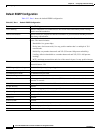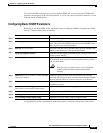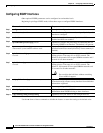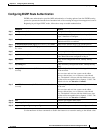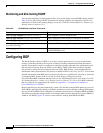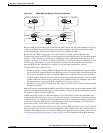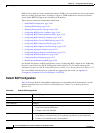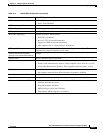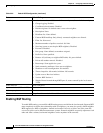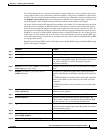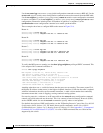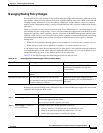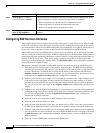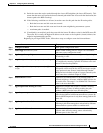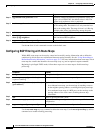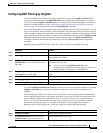
32-42
Cisco ME 3400 Ethernet Access Switch Software Configuration Guide
78-17058-01
Chapter 32 Configuring IP Unicast Routing
Configuring BGP
Enabling BGP Routing
To enable BGP routing, you establish a BGP routing process and define the local network. Because BGP
must completely recognize the relationships with its neighbors, you must also specify a BGP neighbor.
BGP supports two kinds of neighbors: internal and external. Internal neighbors are in the same AS;
external neighbors are in different autonomous systems. External neighbors are usually adjacent to each
other and share a subnet, but internal neighbors can be anywhere in the same AS.
Neighbor
• Advertisement interval: 30 seconds for external peers; 5 seconds for internal peers.
• Change logging: Enabled.
• Conditional advertisement: Disabled.
• Default originate: No default route is sent to the neighbor.
• Description: None.
• Distribute list: None defined.
• External BGP multihop: Only directly connected neighbors are allowed.
• Filter list: None used.
• Maximum number of prefixes received: No limit.
• Next hop (router as next hop for BGP neighbor): Disabled.
• Password: Disabled.
• Peer group: None defined; no members assigned.
• Prefix list: None specified.
• Remote AS (add entry to neighbor BGP table): No peers defined.
• Private AS number removal: Disabled.
• Route maps: None applied to a peer.
• Send community attributes: None sent to neighbors.
• Shutdown or soft reconfiguration: Not enabled.
• Timers: keepalive: 60 seconds; holdtime: 180 seconds.
• Update source: Best local address.
• Version: BGP Version 4.
• Weight: Routes learned through BGP peer: 0; routes sourced by the local router:
32768.
Route reflector None configured.
Synchronization (BGP and IGP) Enabled.
Table map update Disabled.
Timers Keepalive: 60 seconds; holdtime: 180 seconds.
Table 32-9 Default BGP Configuration (continued)
Feature Default Setting



